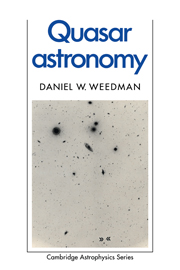Summary
Introduction
Decisions have to be made regarding the nature of the universe before observed properties of quasars can be transformed into intrinsic properties. We must adopt a cosmology. My objective is not to derive formally the equations of cosmology, as that has been done thoroughly many times. The ultimate purpose of this chapter is to justify these equations qualitatively while putting most of the quantitative effort into describing how to use them to study quasars. The cosmologies to be adopted were derived long before quasars were discovered, but their use became a much more serious affair once quasars had to be considered. This is because the redshifts of quasars are often sufficiently high that differences among different cosmologies become quite large. For most galaxies, by contrast, even the difference between newtonian and relativistic cosmologies can be ignored. We can certainly not yet guarantee the equations of favored cosmologies as applying to the real universe. Once a single cosmology is adopted for it, the universe is forced to become a simple place as regards the structure of spacetime. As long as such a simple universe fits what we see, it is appropriate to retain it. There is certainly little motivation for arbitrarily postulating increased complications; nevertheless, observers must forever be on the alert for those anomalies which would show the simple models to be valid no longer. There is a vested interest in having a simple universe, as that is the only kind we can understand.
- Type
- Chapter
- Information
- Quasar Astronomy , pp. 45 - 69Publisher: Cambridge University PressPrint publication year: 1986

